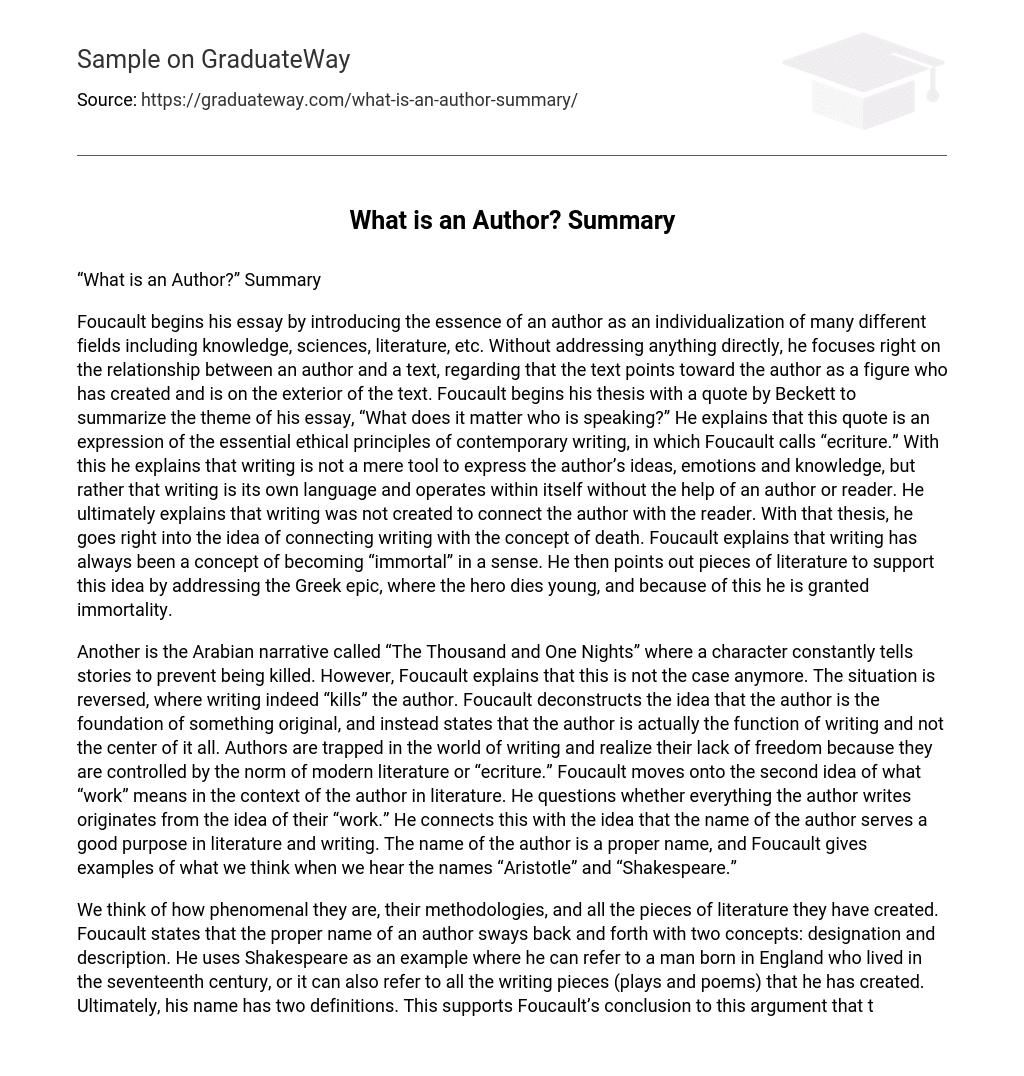Foucault begins his essay by introducing the essence of an author as an individualization of many different fields including knowledge, sciences, literature, etc. Without addressing anything directly, he focuses right on the relationship between an author and a text, regarding that the text points toward the author as a figure who has created and is on the exterior of the text. Foucault begins his thesis with a quote by Beckett to summarize the theme of his essay, “What does it matter who is speaking?” He explains that this quote is an expression of the essential ethical principles of contemporary writing, in which Foucault calls “ecriture.” With this he explains that writing is not a mere tool to express the author’s ideas, emotions and knowledge, but rather that writing is its own language and operates within itself without the help of an author or reader. He ultimately explains that writing was not created to connect the author with the reader. With that thesis, he goes right into the idea of connecting writing with the concept of death. Foucault explains that writing has always been a concept of becoming “immortal” in a sense. He then points out pieces of literature to support this idea by addressing the Greek epic, where the hero dies young, and because of this he is granted immortality.
Another is the Arabian narrative called “The Thousand and One Nights” where a character constantly tells stories to prevent being killed. However, Foucault explains that this is not the case anymore. The situation is reversed, where writing indeed “kills” the author. Foucault deconstructs the idea that the author is the foundation of something original, and instead states that the author is actually the function of writing and not the center of it all. Authors are trapped in the world of writing and realize their lack of freedom because they are controlled by the norm of modern literature or “ecriture.” Foucault moves onto the second idea of what “work” means in the context of the author in literature. He questions whether everything the author writes originates from the idea of their “work.” He connects this with the idea that the name of the author serves a good purpose in literature and writing. The name of the author is a proper name, and Foucault gives examples of what we think when we hear the names “Aristotle” and “Shakespeare.”
We think of how phenomenal they are, their methodologies, and all the pieces of literature they have created. Foucault states that the proper name of an author sways back and forth with two concepts: designation and description. He uses Shakespeare as an example where he can refer to a man born in England who lived in the seventeenth century, or it can also refer to all the writing pieces (plays and poems) that he has created. Ultimately, his name has two definitions. This supports Foucault’s conclusion to this argument that the name value of an author contributes to their work having more value in comparison to other texts that have no author. Foucault breaks down the four features of texts that create the author function: Texts are a form of property, the “author function” is not present in every single text and is not a constant feature in writing, the “author function” is not created spontaneously; it is made up of different constructions, and the text or writing always contains signs in reference to the author.
In conclusion, Foucault sums up the function of the author and explains that it is connected to the “universe of discourses.” He establishes the idea that in order to make sense of a text, knowing and studying the relationship between itself and the author is essential. He also discusses how he wishes for a culture without the need for authorship, but at the same time admitted that it would be “pure romanticism” if such a situation occurred. But Foucault ultimately explains that he looks forward to a day where a work’s importance is regulated by its original and own content and not by the voice behind it.





